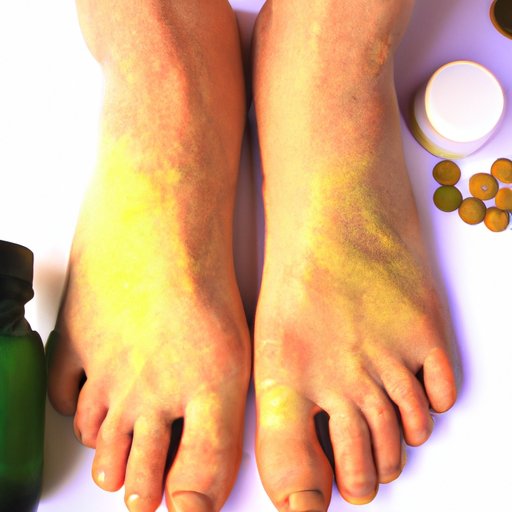Introduction
Foot swelling, also known as edema, is a common issue that affects many people. It can occur due to various reasons, such as standing or sitting for too long, injuries, medical conditions, and pregnancy. In this article, we will cover the causes of foot swelling, natural remedies, foods that can reduce swelling, foot care techniques, medical causes and treatments, anti-inflammatory medications, and lifestyle changes. By the end of this article, you will have a better understanding of how to reduce swelling in your feet.
Common Causes of Foot Swelling
One of the most common causes of foot swelling is sitting or standing for too long periods. Other common causes include injuries, medical conditions, such as heart or kidney disease, and pregnancy. There are several tips for avoiding or reducing swelling, such as taking frequent breaks to walk or stretch, wearing comfortable shoes, and maintaining good posture.
Natural Remedies to Reduce Foot Swelling
There are natural remedies that can help alleviate foot swelling. Massage is one of the most effective natural remedies for reducing swelling. You can choose from various types of massage, such as deep tissue, reflexology, or lymphatic drainage massage. All these types of massage can help stimulate blood circulation and reduce inflammation. Exercise can also help reduce swelling, by improving blood flow and reducing fluid buildup. There are several types of exercises that you can perform, such as walking, cycling, or swimming. Elevation is another effective way to reduce swelling. By elevating your feet, you can improve blood flow and reduce swelling. Applying ice or cold water to the affected area can help reduce swelling and inflammation.
Food That Can Reduce Swelling
There are several foods that can help reduce swelling in the body. Foods rich in potassium, such as bananas, spinach, and avocados can help reduce swelling by balancing the sodium levels in the body. Foods rich in magnesium, such as nuts, seeds, and whole grains, can help reduce swelling by reducing inflammation. Foods containing Quercetin, such as apples, berries, and onions, have anti-inflammatory properties, which can also help reduce swelling.
Foot Care Techniques for Swelling Reduction
Using arch support can help reduce swelling by providing support and improving blood flow. Soaking your feet in Epsom salt water can also help reduce swelling by relaxing the muscles and reducing inflammation. Compression socks or stockings can also be effective in reducing swelling by applying pressure to the affected area.
Medical Causes and Treatments
Foot swelling can also be caused by various medical conditions, such as heart or kidney disease, or by certain medications. It is important to consult your doctor if you experience persistent or painful swelling. Your doctor may conduct tests and imaging, such as blood tests, X-rays, or ultrasounds, to diagnose the underlying cause of the swelling. Treatment options may include medications, such as diuretics, or surgery, in more severe cases.
Anti-Inflammatory Medications
Anti-inflammatory medications, such as non-steroidal anti-inflammatory drugs (NSAIDs), can help reduce swelling and inflammation. They work by blocking the production of prostaglandins, which are responsible for pain and swelling. However, it is important to use these medications safely and effectively, as they may have side-effects such as stomach ulcers, kidney damage, or elevated blood pressure.
Lifestyle Changes
Making lifestyle changes can also help reduce foot swelling. Reducing salt intake can help balance the fluids in the body and prevent fluid buildup. Exercise can also help improve blood flow and reduce inflammation. Maintaining a healthy weight can help reduce the pressure on your feet and improve your overall health.
Conclusion
Foot swelling is a common issue that can cause discomfort and pain. By using natural remedies, food, foot care techniques, medical treatments, anti-inflammatory medications, and lifestyle changes, you can reduce swelling and improve your quality of life. Remember, if you experience persistent or painful swelling, consult your doctor to determine the underlying cause and receive appropriate treatment.
